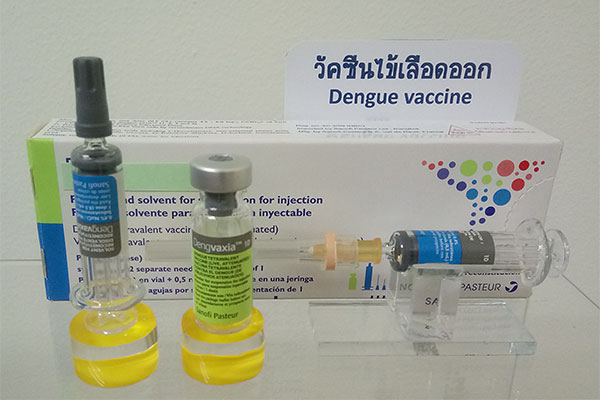Impact of Dengue Vaccination on Serological Diagnosis: Insights from Phase III Dengue Vaccine Efficacy Trials
ศูนย์วัคซีน คณะเวชศาสตร์เขตร้อน มหาวิทยาลัยมหิดล



{:th}
Impact of Dengue Vaccination on Serological Diagnosis: Insights from Phase III Dengue Vaccine Efficacy Trials
ศูนย์วัคซีน คณะเวชศาสตร์เขตร้อน มหาวิทยาลัยมหิดล
ผลงานวิจัย :
Impact of Dengue Vaccination on Serological Diagnosis: Insights from Phase III Dengue Vaccine Efficacy Trials
ผู้วิจัย :
Plennevaux E, Moureau A, Arredondo-García JL, Villar L, Pitisuttithum P, Tran NH, Bonaparte M, Chansinghakul D, Coronel DL, L’Azou M, Ochiai RL, Toh ML, Noriega F, Bouckenooghe A
Background : We previously reported that vaccination with the tetravalent dengue vaccine (CYD-TDV; Dengvaxia) may bias the diagnosis of dengue based on immunoglobulin M (IgM) and immunoglobulin G (IgG) assessments.
Methods : We undertook a post hoc pooled analysis of febrile episodes that occurred during the active surveillance phase (the 25 months after the first study injection) of 2 pivotal phase III, placebo-controlled CYD-TDV efficacy studies that involved ≥31000 children aged 2-16 years across 10 countries in Asia and Latin America. Virologically confirmed dengue (VCD) episode was defined with a positive test for dengue nonstructural protein 1 antigen or dengue polymerase chain reaction. Probable dengue episode was serologically defined as (1) IgM-positive acute- or convalescent-phase sample, or (2) IgG-positive acute-phase sample and ≥4-fold IgG increase between acute- and convalescent-phase samples.
Results : There were 1284 VCD episodes (575 and 709 in the CYD-TDV and placebo groups, respectively) and 17673 other febrile episodes (11668 and 6005, respectively). Compared with VCD, the sensitivity and specificity of probable dengue definition were 93.1% and 77.2%, respectively. Overall positive and negative predictive values were 22.9% and 99.5%, respectively, reflecting the much lower probability of correctly confirming probable dengue in a population including a vaccinated cohort. Vaccination-induced bias toward false-positive diagnosis was more pronounced among individuals seronegative at baseline.
Conclusions : Caution will be required when interpreting IgM and IgG data obtained during routine surveillance in those vaccinated with CYD-TDV. There is an urgent need for new practical, dengue-specific diagnostic algorithms now that CYD-TDV is approved in a number of dengue-endemic countries.

การนำไปใช้ประโยชน์ : วัคซีนป้องกันโรคไข้เลือดออก
การเผยแพร่ผลงาน : Clin Infect Dis. 2018 Apr 3; 66(8): 1164 – 1172.
DOI: 10.1093/cid/cix966.
การติดต่อ :
ศ.พญ.พรรณี ปิติสุทธิธรรม
คณะเวชศาสตร์เขตร้อน มหาวิทยาลัยมหิดล
+66 2 643 5599
{:}{:en}
Impact of Dengue Vaccination on Serological Diagnosis: Insights from Phase III Dengue Vaccine Efficacy Trials
Vaccine Trial Centre, Faculty of Tropical Medicine, Mahidol University
Title :
Impact of Dengue Vaccination on Serological Diagnosis: Insights from Phase III Dengue Vaccine Efficacy Trials
Researchers :
Plennevaux E, Moureau A, Arredondo-García JL, Villar L, Pitisuttithum P, Tran NH, Bonaparte M, Chansinghakul D, Coronel DL, L’Azou M, Ochiai RL, Toh ML, Noriega F, Bouckenooghe A
Background : We previously reported that vaccination with the tetravalent dengue vaccine (CYD-TDV; Dengvaxia) may bias the diagnosis of dengue based on immunoglobulin M (IgM) and immunoglobulin G (IgG) assessments.
Methods : We undertook a post hoc pooled analysis of febrile episodes that occurred during the active surveillance phase (the 25 months after the first study injection) of 2 pivotal phase III, placebo-controlled CYD-TDV efficacy studies that involved ≥31000 children aged 2-16 years across 10 countries in Asia and Latin America. Virologically confirmed dengue (VCD) episode was defined with a positive test for dengue nonstructural protein 1 antigen or dengue polymerase chain reaction. Probable dengue episode was serologically defined as (1) IgM-positive acute- or convalescent-phase sample, or (2) IgG-positive acute-phase sample and ≥4-fold IgG increase between acute- and convalescent-phase samples.
Results : There were 1284 VCD episodes (575 and 709 in the CYD-TDV and placebo groups, respectively) and 17673 other febrile episodes (11668 and 6005, respectively). Compared with VCD, the sensitivity and specificity of probable dengue definition were 93.1% and 77.2%, respectively. Overall positive and negative predictive values were 22.9% and 99.5%, respectively, reflecting the much lower probability of correctly confirming probable dengue in a population including a vaccinated cohort. Vaccination-induced bias toward false-positive diagnosis was more pronounced among individuals seronegative at baseline.
Conclusions : Caution will be required when interpreting IgM and IgG data obtained during routine surveillance in those vaccinated with CYD-TDV. There is an urgent need for new practical, dengue-specific diagnostic algorithms now that CYD-TDV is approved in a number of dengue-endemic countries.

Publishing : Clin Infect Dis. 2018 Apr 3; 66(8): 1164 – 1172.
DOI: 10.1093/cid/cix966.
Key Contact Person :
Prof.Dr.Punnee Pitisuttithum
Faculty of Tropical Medicine, Mahidol University
+66 2 643 5599